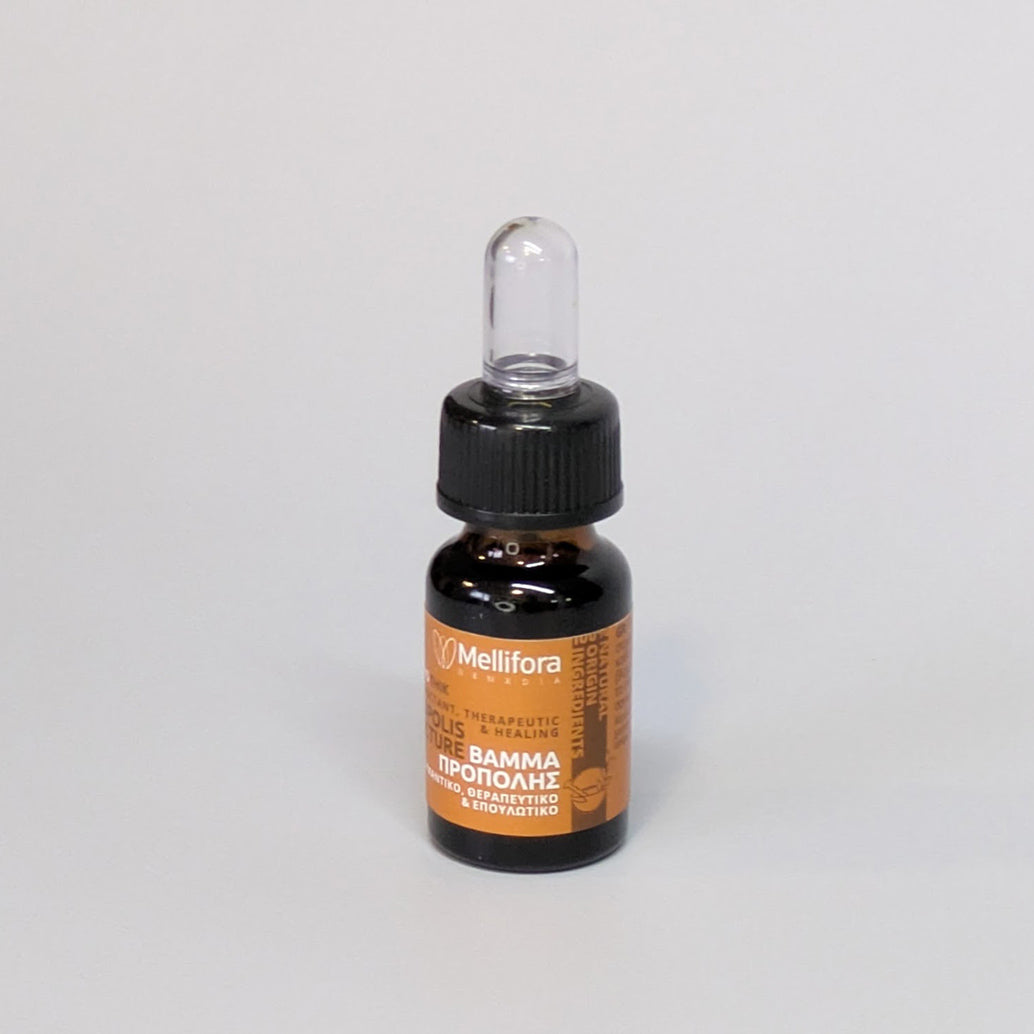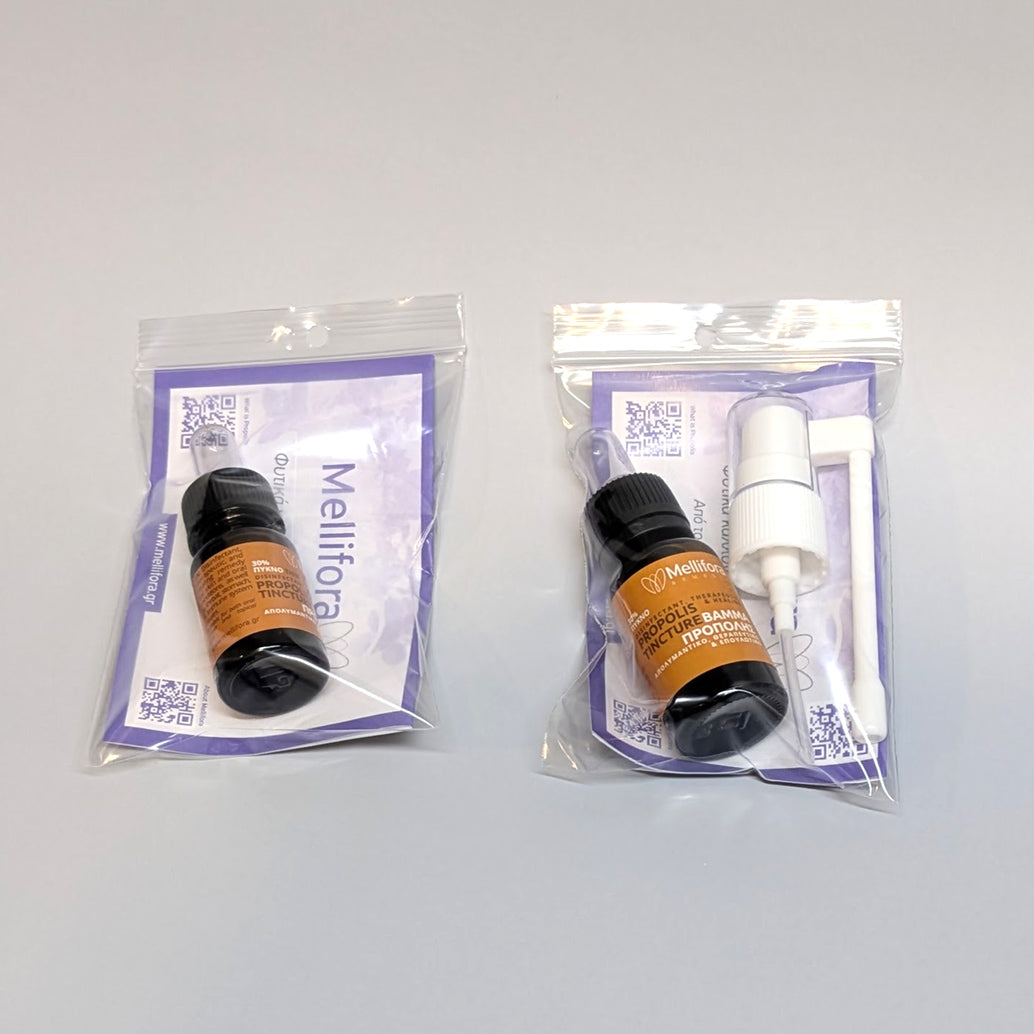Mellifora
Propolis tincture thick
Propolis tincture thick
Couldn't load pickup availability
- Description
- How to use
- What is propolis
- Related products
Disinfectant - therapeutic - healing tincture of Olympus propolis
for skin and oral health, for the throat, stomach and immune system. Suitable for internal and external use.This dense propolis tincture is manufactured from our own propolis, collected from the Olympus mountainsides. While preparing the tincture, the propolis is not heated above 30 degrees Celsius. Instead of heating, we increase the duration of the extraction to 2 months. Propolis is infused in pure drinkable alcohol 85% vpv. During this time, all the valuable therapeutic ingredients of propolis are extracted without disturbing or destroying their properties. The Mellifora propolis is available in two sizes: 7ml and 10ml bottles. The 10ml bottle includes a dropper and an additional mouth sprayer for easier spraying deep into the larynx.
External use: one drop in the affected area (wound aphthous, herpes, burns, cuticle)
Oral use:3 drops of tincture deep in the throat or if tincture is too dense, mix the drops in a teaspoon of honey or the Mellifora herbal cough syrup, or another drink (e.g. brandy). Let it sit in the throat for a while before swallowing and digesting into the stomach.
For the immune system and stomach: drink a small amount of water with 2-3 drops of tincture twice a day on an empty stomach. Alternatively use the diluted solution (30ml) of propolis, which is the best option for this use and does not stain the glass.
Bees use propolis in a variety of ways in the hive. One use is to prevent entrance to the hive when they are in danger, protecting their community from various enemies, either large in size, like mice or microscopic ones, like microbes and viruses. This powerful substance protects the magical world of bees.
The therapeutic properties of propolis, called "black wax" at the time, have been known since antiquity. Using propolis, bees sterilize the hive and protect themselves from infections. Also, bees use it as construction material for the hive, filling cracks and cavities. The beekeepers gather this precious material from the walls and panels of the hive. Bees polish the inner part of the beehive cells all year long, ensuring that the egg produced by the queen will grow in a sterilized environment and produce a healthy pupa and larva.
Propolis IngredientsPropolis is made of resinous substances gathered by the bees from tree trunks. Bees mix it with wax and pollen and they enhance it with trace elements, amino acids and vitamins (B3, K). Propolis is mainly composed of 50% resin, 30% wax, 10% essential oils, 5% pollen, enzymes, aromatic substances, sugars, balsams and various other components. The chemical composition and natural properties of propolis vary upon the flora of each region, since different plants provide the bees with different resinous substances. This is why the color of propolis may be different, from dark green to brown to white yellow. It has a pleasant sent, like incense, vanilla and wax mixed with honey. Its aroma depends on the essential oils it contains. It cannot be dissolved in water, but it is dissolved in alcohol, glycol and other organic solvents.
Therapeutic properties of propolisThe Egyptians were aware of the antiseptic properties of propolis and they utilized them in the mummification process. Ancient Greek and Roman therapists, like Dioscorides, Pliny and Galen viewed propolis as antiseptic and disinfectant. In the 17th century, the London pharmacopoeia listed propolis as an official medicine.
The beneficial action of propolis is now proven. Lab experiments illustrated its antimicrobial and anti-fungal activity, since it inhibited the action of 25 bacteria from a total of 29 and inhibited the growth of 20 species of fungi among 39. It has been proven effective against the viruses of polio, herpes, stomatitis and adenitis. Moreover, it has been effective against parasites, like trichomonas, trypanosome and etc.
The use of propolis with antibiotics decreases the side effects of the latter. More importantly, long-term use of propolis does not lead to resistant pathogenic microorganisms, while it easily destroys pathogens resistant to antibiotics. Propolis acts against staphylococcus and streptococcus, which cause infections to the oral cavity. It contains antibacterial substances and prevents the flu and hepatitis. Propolis also has antioxidant properties and protects vitamin C from oxidation. It has been reported that propolis in combination with pollen can alleviate allergies. Finally, it accelerates the healing of damaged tissue, mainly because of essential oils.
Use of propolisPropolis is used to treat external and internal injuries of the respiratory system and the oral cavity. It is used against gastric ulcer, prostate problems, gynecological problems, mycosis, and virosis. It can help with chronic otitis, sinusitis, rheumatic arthritis and spinal ankylosis. It has positive effects in treating vasomotor nerves that cause sniffles. It is therefore the main component in cosmetics, facial creams, soaps, shampoos and toothpastes, as well as in a number of therapeutic preparations, like sore throat pastilles, cough syrup, potables for stomach and immune system, etc.
The therapeutic uses of propolis and other bee products are so many that there is a whole new science called Apitherapy.
From this aromatic and pure propolis we create dilutions and oil extracts using scientific knowledge and methods and ensure to preserve all the therapeutic qualities. The product is available like this or in dense dilution or in products like cosmetics, soaps and therapeutic products, like
- Propolis tincture thick (internal and external use) 7ml or 10 ml
- Propolis tincture thin 30ml for internal use
- Propolis tincture nasal spray 10 ml
- Antiflu Solution of propolis-echinacea-herbs.
- Propolis wax ointment
Share
You will get 10% cashback on this order.
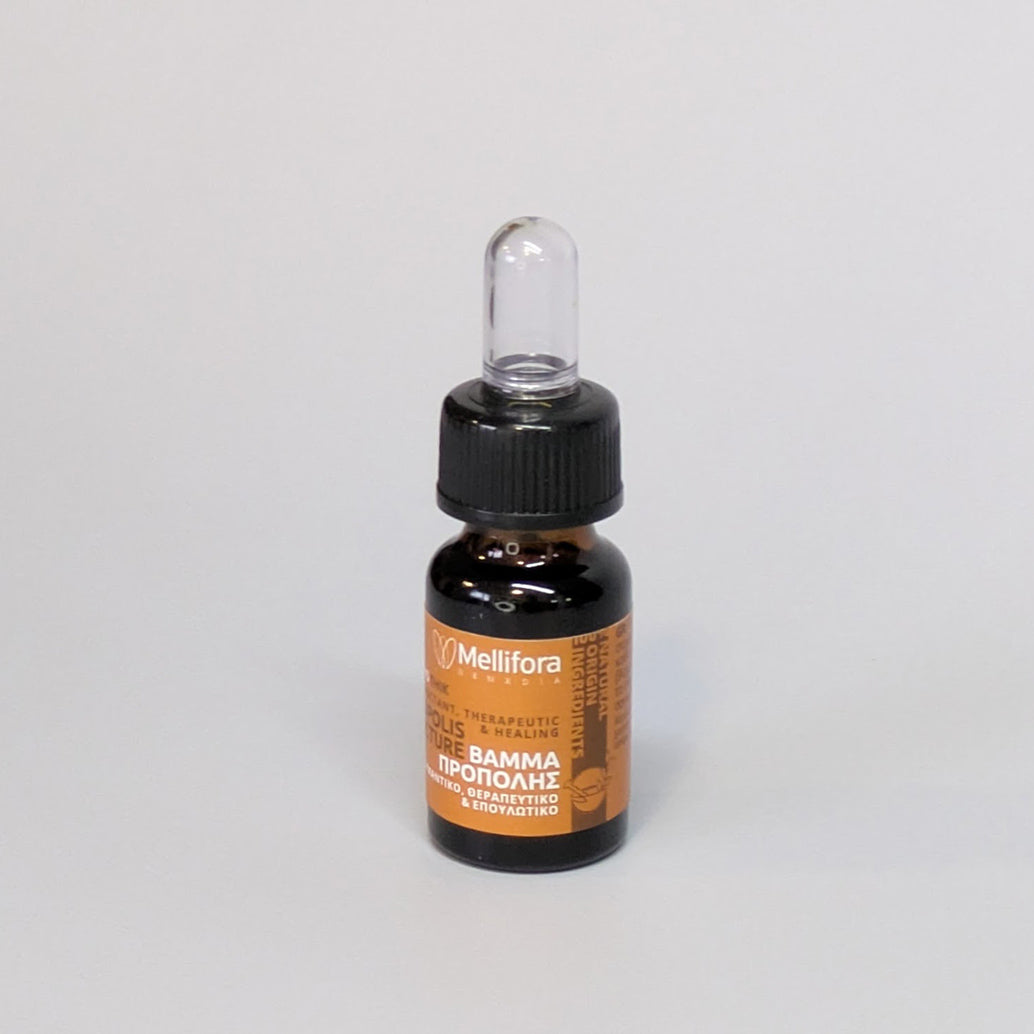
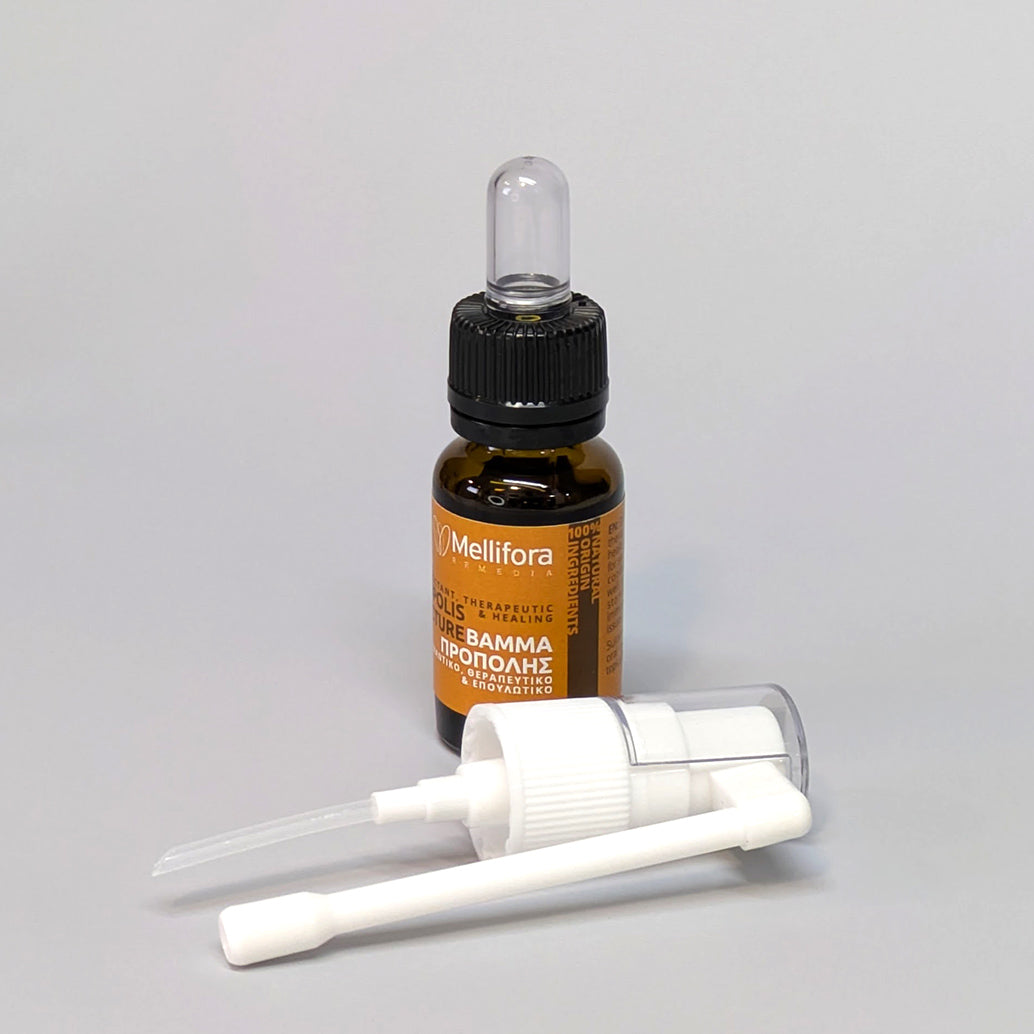
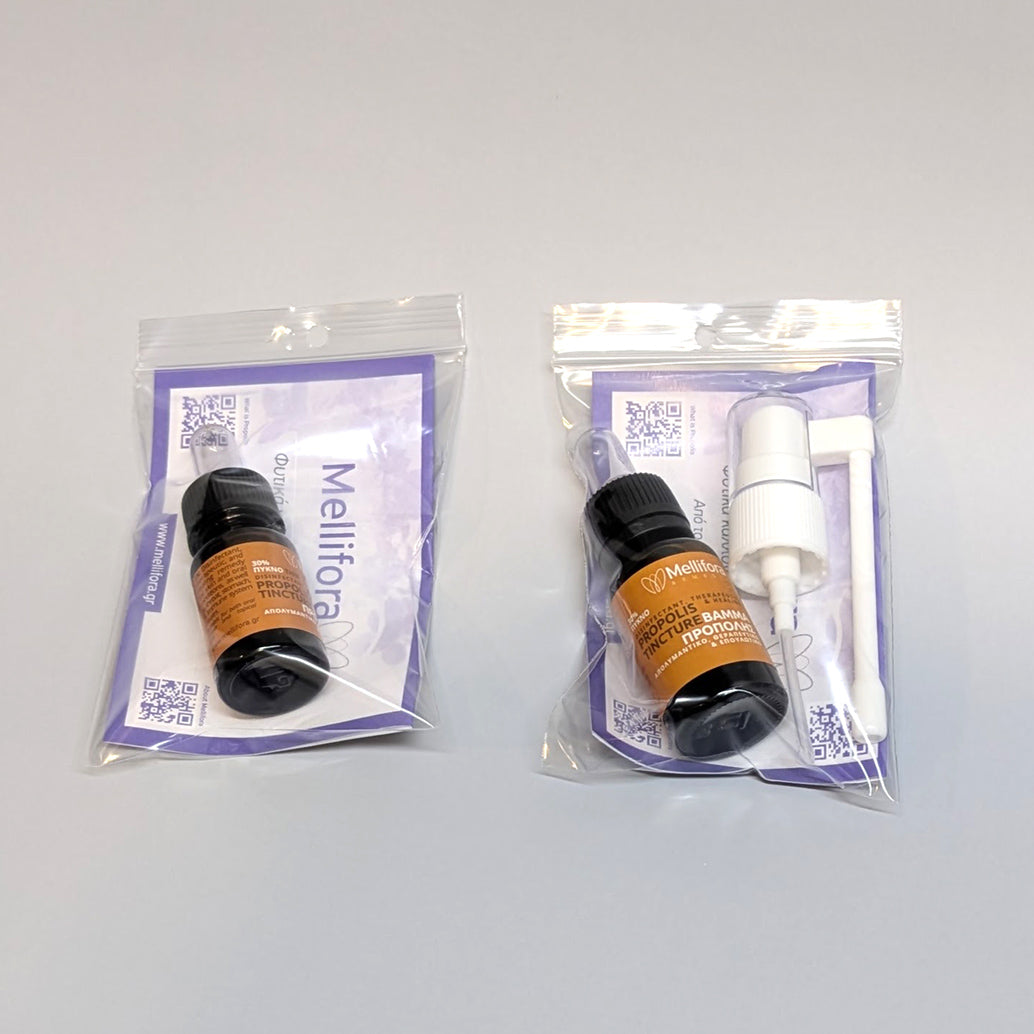
Πολύ καλό και αποτελεσματικό.
Νικάει την βραχνάδα και τον πονόλαιμο!
Σε σχέση με άλλα σκευάσματα, η γεύση του είναι πιοήπια
Από τα καλύτερα βάμματα πρόπολης που έχω δοκιμάσει με διάφορα!!!!
Το συγκεκριμένο προϊόν έχει άμεση δράση εφόσον το χρησιμοποιήσει κάποιος έγκαιρα, όσον αφορά στις αμυγδαλές! Με το που νιώσεις κάποια ενόχληση ενσταλάζεις μια-δυο σταγόνες και καθάρισες. Και αυτό με δίχως τα χημικά που περιέχονται σε άλλα σκευάσματα. Η δύναμη της αγνής φύσης στο χέρι σου!
Ιδανικό για πονόλαιμο και κόκκινες αμυγδαλες !Αμεσα αποτελέσματα
Ευχαριστούμε!

